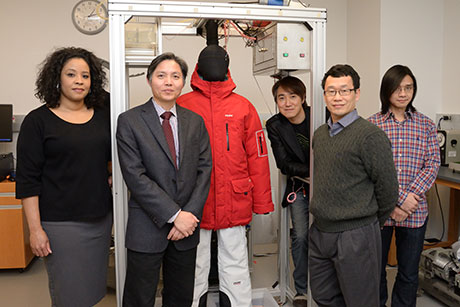Hot fashion: DOE awards $3M grant for ‘air-conditioned’ clothing
By Blaine Friedlander

Warming up to a brisk idea, the U.S. Department of Energy’s Advanced Research Projects Agency has awarded Cornell fiber science and engineering researchers a $3 million grant to create new clothes that integrate microscale tubes – to direct warm or cold air – into undergarment fabrics that adjust to cool and heated conditions.
Think personal air-conditioning: Clothing that cools or warms the body by a few degrees – via air flowing through micro-tubes in the fabric – helping to reduce energy waste in buildings. Colleagues won’t need to wrestle each other for control of the office thermostat and it could potentially save up to 15 percent in heating, ventilation and air conditioning energy consumption. All the while, it could achieve total comfort for each building occupant.
“This will have a transformative impact on the nation’s electricity usage, consumption of fuels and greenhouse gas emissions. It will also improve comfort and revolutionize lifestyle,” said Jintu Fan, the Vincent V.C. Woo Professor and Chair of the Department of Fiber Science & Apparel Design in the College of Human Ecology. Fan, along with other faculty, will develop “thermoregulatory” clothing that will, in effect, expand the comfortable temperature settings for buildings.
Joining Fan on this grant are Tasha Lewis, assistant professor of fiber science and apparel design; Huiju Park, assistant professor of fiber science and apparel design; Edwin Kan, professor of electrical engineering; and Ronggui Yang, associate professor of mechanical engineering, University of Colorado at Boulder.
Fan and colleagues will integrate advanced textile technology, state-of-the-art electronics and thermal management technologies – that provide sensing, control and cognitive communication with the room unit – into functional energy-saving designs that are comfortable, wearable, washable and safe.
They hope to create a clothing system that will sense the wearer’s skin temperature and activate a heated or cooled airflow around the person. Fan explains that prototype fabrics and garments will be tested on “Walter,” a sweating mannequin in his laboratory that was developed to assess performance apparel.
While this research is designed for indoor environments, Fan believes that there also will be outdoor applications for this thermoregulatory clothing
This technology is managed by the Cornell Center for Technology Enterprise and Commercialization (CCTEC) and the licensing officer is Carolyn Theodore.
Media Contact
Get Cornell news delivered right to your inbox.
Subscribe